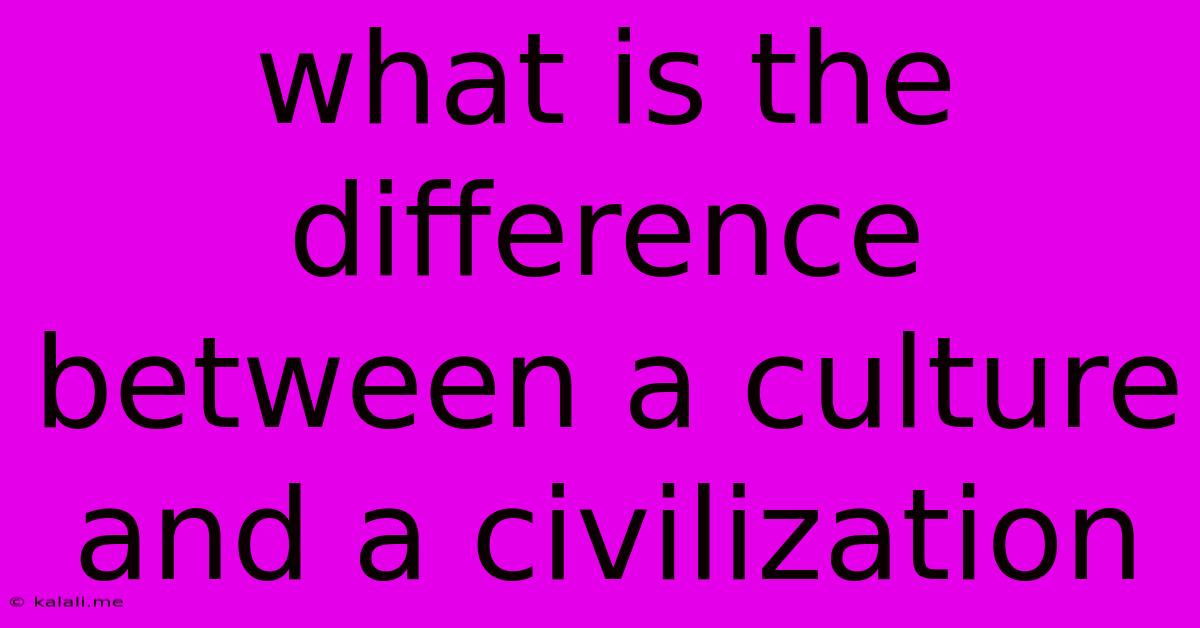What Is The Difference Between A Culture And A Civilization
Kalali
Jun 14, 2025 · 3 min read

Table of Contents
Culture vs. Civilization: Unraveling the Distinctions
Culture and civilization are often used interchangeably, leading to confusion about their distinct meanings. While closely related, they represent different aspects of human society. This article will delve into the key differences between culture and civilization, clarifying their nuances and highlighting their interconnectedness. Understanding this distinction is crucial for anyone studying anthropology, sociology, or history, or simply for anyone interested in understanding the complexities of human societies.
What is Culture?
Culture encompasses the shared beliefs, values, customs, behaviors, and artifacts that characterize a group or society. It's the learned and transmitted system of meanings and practices that shape how people interact with their environment and each other. This includes:
- Material culture: Tangible objects such as clothing, tools, architecture, and art.
- Non-material culture: Intangible aspects like language, beliefs, values, norms, and traditions. This also includes social structures, family systems, and political organizations.
- Shared Practices: Rituals, ceremonies, and daily routines that reinforce cultural norms and values.
Culture is incredibly diverse, varying across geographical locations, ethnic groups, and even within societies. A single country might encompass multiple distinct cultures, each with its unique characteristics. The transmission of culture happens through socialization, education, and imitation, ensuring its continuity across generations. Cultural change is a constant, shaped by internal factors like innovation and external influences like globalization and migration.
What is Civilization?
Civilization, in contrast, typically refers to a complex society characterized by certain advanced features. It's a more encompassing term than culture, often implying a higher level of societal organization and technological advancement. Key characteristics include:
- Urbanization: The development of cities as centers of population, trade, and administration.
- Specialized labor: The division of labor into different occupations and roles, leading to increased efficiency and productivity.
- Social stratification: The development of social hierarchies and class structures.
- Organized government: Formal political institutions and systems of governance.
- Advanced technology: The development of tools, techniques, and infrastructure that improve the quality of life.
- Writing systems: The development of written language, crucial for record-keeping, communication, and the transmission of knowledge.
- Complex religious and philosophical systems: Elaborate belief systems and ideologies that shape societal values and behaviors.
The Interrelationship of Culture and Civilization:
While distinct, culture and civilization are deeply intertwined. Civilization can be seen as a stage or type of society that exhibits certain cultural traits. A civilization’s culture reflects its values, beliefs, and worldview, which in turn influences its social structures, political systems, and technological development. For example, the development of irrigation systems in ancient Mesopotamia was not only a technological advancement (a hallmark of civilization) but also reflected the cultural values and priorities of that society.
Key Differences Summarized:
| Feature | Culture | Civilization |
|---|---|---|
| Scope | Broader, encompassing shared beliefs and practices | Narrower, focusing on complex societal structures |
| Characteristics | Beliefs, values, customs, behaviors, artifacts | Urbanization, specialized labor, government, technology |
| Development | Evolves organically, transmitted through generations | Emerges through a process of societal development |
| Complexity | Can range from simple to complex | Typically associated with complex societies |
In conclusion, while the terms are sometimes used interchangeably, understanding the nuances between culture and civilization is essential. Culture refers to the shared ways of life of a group of people, while civilization denotes a more advanced stage of societal development characterized by specific structural and technological features. Both concepts are intrinsically linked, with a civilization's culture shaping and reflecting its complexity and advancements.
Latest Posts
Latest Posts
-
Which Of The Following Is True About Fungi
Jun 14, 2025
-
Lcm Of 6 7 And 8
Jun 14, 2025
-
Choose The Sentence With Correct Punctuation
Jun 14, 2025
-
Kinetic Energy Of Simple Harmonic Motion
Jun 14, 2025
-
What Day Will It Be In 61 Days
Jun 14, 2025
Related Post
Thank you for visiting our website which covers about What Is The Difference Between A Culture And A Civilization . We hope the information provided has been useful to you. Feel free to contact us if you have any questions or need further assistance. See you next time and don't miss to bookmark.